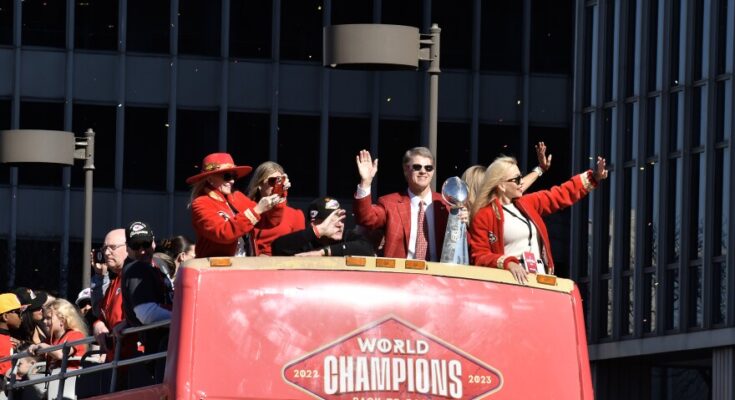“Kansas City Chiefs Make Surprising $25,000 Donation to Missouri House GOP Campaign Fund Amid Ongoing Stadium Negotiation Saga”
The Kansas City Chiefs, a cornerstone institution in Missouri, have quietly yet strategically contributed $25,000 to the House Republican Campaign Committee, marking their first significant political donation within the state this year. The contribution, delivered on Tuesday, comes at an especially consequential moment, arriving only months after Missouri lawmakers approved an estimated $1.5 billion stadium funding plan designed to secure the Chiefs—and the Royals—for the long term. While publicly presented as another illustration of civic engagement, the donation nonetheless underscores the intensifying interplay between sports, politics, and economic leverage in the region.
This contribution of $25,000 to the GOP-aligned political action committee is notably the largest check the franchise has issued in Missouri in 2025 . It raises eyebrows not only because of its timing but also because of its broader implications. Last year, when voters resoundingly rejected a sales tax extension meant to fund renovations at Arrowhead Stadium and the Royals’ new downtown ballpark, the Chiefs spent more than $3 million supporting the measure, while the Royals poured in about $2.5 million and an additional $260,000 to other local political groups. Both drew on their substantial economic footprint in the Kansas City metro, but their efforts were rebuffed by the electorate .
Now, with legislative momentum behind a plan allocating state taxes generated around Arrowhead and Kauffman Stadiums toward bond payments for stadium improvements, the political stakes have only heightened . Missouri’s proposed legislation, scoping close to $1.5 billion over 30 years, could cover up to half the costs of renovation or construction. Kansas, by contrast, has recently offered incentives that would cover as much as 70 % of stadium costs, placing additional pressure on Missouri to maintain its persuasive edge.
The Chiefs’ $25,000 donation is emblematic of their greater political engagement—though at this low-five-digit level, it’s more symbolic than decisive. Still, contributions to PACs such as the House Republican Campaign Committee serve as an efficient conduit for organizations like football teams to align with political currents without the constraints of direct candidate support . Moreover, the fact that this represents their first major political contribution in Missouri this year reflects a shift in strategy—from aggressive public tax campaigns to more subtle political influence.
It is worth framing this not as transactional quid pro quo but as a reflection of the well-recognized power of sports franchises to sway public policy. Missouri lawmakers from both ends of the aisle have long understood the Chiefs and Royals as more than mere entertainment entities—they function as significant economic engines. Maintaining them in state—and in this metropolitan region—is widely perceived as a public good .
Nevertheless, this cultural and economic investment has not gone unchallenged. Critics often highlight that public funding of stadiums rarely delivers commensurate economic returns. A growing chorus of economists maintained decades ago that stadiums tend to redistribute—rather than generate—economic activity, channeling entertainment dollars away from elsewhere into a new venue, without necessarily adding to the overall economic pie . Indeed, the specter of past franchise departures — most recently the Rams, who left St. Louis for Los Angeles, leaving behind a Perlman-financed dome — continues to fuel fears of possible repeat scenarios if incentives fail .
Meanwhile, Kansas’s push to attract the Chiefs and Royals illustrates how inter-state competition can intensify franchise leverage. Kansas lawmakers passed legislation authorizing STAR bond funding, covering up to 70 % of stadium costs, with some envisioning new entertainment-powered districts and multi-use developments . Missouri’s response—a legislative package featuring bonds, tax revenue redirection, and even tax credits of up to $50 million—is designed to match or outpace Kansas while remaining politically viable.
Against this backdrop, the Chiefs have navigated their political role with a mix of restraint and clarity. Their owners, the Hunt family, have historically contributed nearly exclusively to conservative causes and campaigns—including significant funds to federal and state Republican operatives—though the team itself stays silent in most public settings on partisan divides . The $25,000 donation in 2025 echoes that trend, aimed at a Republican campaign platform but likely intended as part of a broader, multi-channel approach to safeguard the team’s future.
Yet, beyond legislative lobbying, political contributions serve as signals—communication to policymakers that the Chiefs are willing to engage, at least at the institutional level, and expect their interests to be heard. Tuesday’s contribution, coinciding with other donations—such as $30,000 from the Missouri Soybean Association and $10,000 from Mo Medical PAC—reinforces that the platform of influence includes both corporate and political stakeholders .
In the end, the $25,000 check is small among the scale of public funding being considered, but it matters. It’s another piece of the expanding puzzle in which civic identity, economic strategy, and political calculation converge. The Chiefs aren’t merely a football team—they are civic icons, economic pillars, and strategic actors in regional policymaking. As the 2031 stadium lease deadline inches closer, every dollar, collaboration, and signal becomes an integral part of a broader negotiation—crafted in public chambers, PAC checks, and legislative halls.
If there’s a paradox here, it’s that while stadium funding is a hot political issue engaging millions in annual tax revenues, the team’s contribution is a modest one-time gesture. Symbolically, it reaffirms the Chiefs’ presence in the political arena; pragmatically, it aligns them with the camp positioned to keep them rooted in Missouri. In this era of high-stakes franchise bargaining, political action committees and infrastructure funds, a $25,000 donation might not move mountains—but it quietly reinforces that the team understands the terrain and knows where to place its financial flags.



